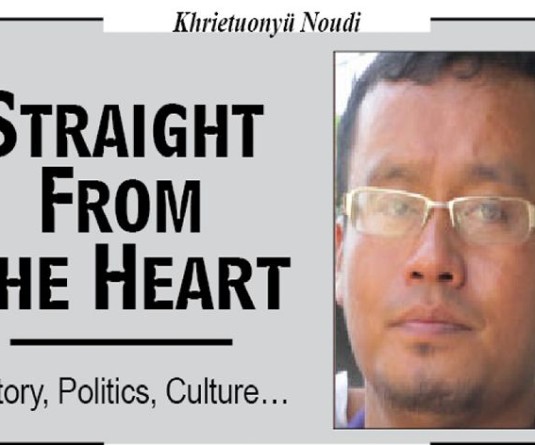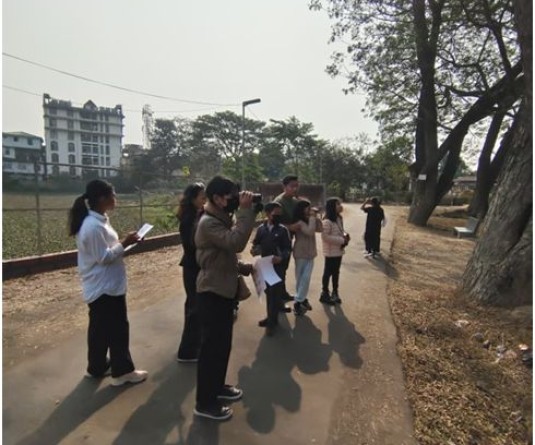
Sushanta Talukdar
Source: Frontline
Congress party ki di se
President rule package
Army rule package di se
(What has the Congress party given?
President’s Rule package,
Army rule package.)
This composition in Nagamese, which is part of an audio compact disc brought out by a music band of the Neiphiu Rio-led Nagaland People’s Front (NPF), has become a big hit among NPF workers and supporters in Kohima and elsewhere in Nagaland. The CD sold like hot cakes as electioneering for the March 5 Assembly polls gained momentum in the State.
On January 3, when Nagaland was brought under President’s Rule for the fourth time since its inception, it not only brought an end to a nearly seven-month-long political drama marked by a series of defections and resignations by legislators but also pushed the State into election mode.
Initially, the imposition of President’s Rule was the bone of contention between the Congress and its arch rival, the NPF. Other issues surfaced after the announcement of the poll dates.
In all, there are 218 candidates for the 60-member Nagaland Assembly. The Congress has fielded candidates in all the 60 seats while the NPF has fielded 56 candidates and decided to support the candidates of its ally, the Bharatiya Janata Party (BJP), in the remaining four seats. Although the BJP has fielded its candidates in 23 constituencies, the two constituents of the ruling Democratic Alliance of Nagaland (DAN) have decided to have “friendly contests” in 19 seats. Wherever the candidate of the NPF or the BJP is weak, he or she will support the other party’s candidate in order to defeat the Congress.
Other parties in the electoral fray include the Nationalist Congress Party (NCP), the Rashtriya Janata Dal (RJD), the Janata Dal (United), the Janata Dal (Secular) and the Lok Janashakti Party. These minor parties are expected to play a crucial role in government formation in case of a split verdict. As a constituent of the DAN government, the JD(U) had two representatives in the Assembly. They have now shifted their loyalty to the Congress.
The NPF and the other participants in the DAN government, which was dismissed a month before it completed its term, described the imposition of President’s Rule as “unconstitutional, illegal and humiliating to the mandate given by the people to the DAN to rule the State” and alleged that it was “politically motivated to suit the Congress’ intention”. The Congress countered the NPF campaign by trying to convince the people that “President’s Rule was a natural corollary of the constitutional crisis that arose after the DAN lost the vote of confidence on December 13 in the State Assembly”.
The NPF, on its part, claimed that it had not lost the trust vote and that it enjoyed a clear majority in a House of reduced strength. It filed a writ petition in the Guwahati High Court challenging the imposition of Central rule.
The Congress alleged that under DAN rule, the law enforcement agencies were unable to act, which was evident from the number of kidnappings and extortions that took place in full view of the police in Dimapur and other towns. The party claimed that after Central rule was imposed about 18 “extortionists” were arrested by the law-enforcing agencies.
Socio-economic issues figured prominently in the poll manifestos of the political parties. However, the imposition of President’s Rule, the “16-point agreement” of July 1960, and the controversy over a 16-page booklet titled Bedrock of Naga Society, published and circulated by the Nagaland Pradesh Congress Committee (NPCC) in 2000, and the ongoing Naga peace process overshadowed other issues.
The 16-point agreement not only sparked off an intense political debate in Nagaland but also had a ripple effect in the neighbouring State of Manipur.
In its manifesto, the Congress promised that “the Indian National Congress in Nagaland would continue to urge on the Government of India the need to implement the 16-point agreement of 1960 in letter and spirit”. Clause 13 of the agreement states that “the other Naga tribes inhabiting the areas contiguous to the present Nagaland be allowed to join Nagaland if they so desire”. Clause 2 of the agreement states that Nagaland shall be placed under the Ministry of External Affairs.
The agreement was arrived at following discussions between Prime Minister Jawaharlal Nehru and leaders of the Naga People’s Convention (NPC), and the Government of India recognised the formation of Nagaland as a full-fledged State within the Union of India. Accordingly, the territory was placed under the Nagaland Transitional Provisions Regulation, 1961, which provided for an Interim Body consisting of 45 members to be elected by various tribes according to the customs, traditions and practice of the respective tribes. Subsequently, Nagaland attained statehood with the enactment of the State of Nagaland Act, 1962, by Parliament. The Interim Body was dissolved on November 30, 1963, and the State of Nagaland was formally inaugurated on December 1, 1963. After elections in January 1964, the first Nagaland Legislative Assembly was constituted on February 11, 1964.
The NPF secretary-general, Chubatemjen Ao, told Frontline that the 16-point agreement had not addressed the ultimate goal of the Naga people. He said the NPF would go beyond the agreement.
On September 25, the National Socialist Council of Nagalim (Isak-Muivah) had issued a decree banning S.C. Jamir and co-author Alemthemshi Jamir from entering Naga soil for “attempting to glorify through the book Bedrock of Naga Society the 16-point agreement” by stating that “attainment of statehood had fulfilled the aspirations of the Nagas” and that “statehood is a reality and sovereignty is myth”. Jamir is the only living signatory to the agreement. The NPF used the booklet as another campaign tool against the Congress. The Congress sought to counter it by saying that Bedrock of Naga Society was a closed chapter. But the NPF insists it has hurt the sentiments of the Naga people.
“The Naga People’s Convention had signed the 16-point agreement, which was to blame for forming the Nagaland State in 1963. The majority of Nagas were divided into different administrative units of Assam, Manipur and Arunachal Pradesh. The 16-point agreement was an imposition of India’s will on Nagas,” said NSCN(I-M) chairman Isak Chisi Swu in his address at the Fourth Consultative meeting held on January 20 and 21, 2005, at the council headquarters at Hebron, 40 km from Dimapur.
The ongoing peace talks between the Centre and the NSCN(I-M) also figured prominently in the electioneering. “The Naga problem is a political issue that has to be resolved through peaceful and painstaking negotiations and through good faith among all sides. All sections of Naga society have to come together to strengthen the peace process in Nagaland. It shall be the endeavour of the Indian National Congress to enlist the support and cooperation of all civil society groups, church organisations and various Hohos, including the village councils,” the Congress promised in its manifesto.
On April 23, 2003, the DAN government constituted a 22-member Consultative Committee of Peace headed by the Chief Minister himself. In accordance with the resolution of the Consultative Committee, the government pursued the policy of “maintaining equi-closeness” to all underground groups and act as a facilitator. The committee also supported the resolution on integration of contiguous Naga-inhabited areas which came before the Legislative Assembly on December 16, 2003.
The Congress alleged that the NPF’s equi-closeness policy had practically reduced the police and the paramilitary forces to “mere spectators” when extortions and inter-factional killings took place. While the outcome of the March 5 polls is expected to have a direct bearing on the fate of the peace process, the NSCN(I-M) says that it does not favour any political party.
It maintains that the “Naga political cause is most important for the NSCN (I-M) and the organisation will not compromise its principles by participating in an election held under the Indian Constitution”. The NSCN (Khaplang) too has asked all Naga underground factions not to involve themselves in any manner in the elections.






